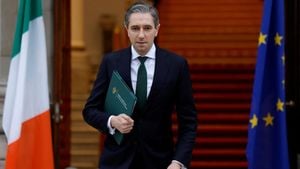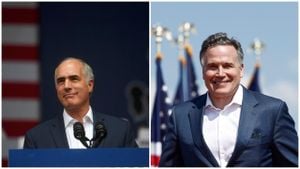The debate over free speech and campus protests has heated up significantly as tensions arise from the war between Israel and Hamas. Following this conflict, many universities across the United States have found themselves at the center of intense discussions on how to balance the right to protest with maintaining civil discourse on campus.
A new report by the Foundation for Individual Rights and Expression (FIRE) exposes troubling trends related to free speech on campuses. The report reveals declining trust among students toward their administrations' commitment to safeguarding First Amendment rights, particularly among marginalized communities. Nearly three-quarters of students surveyed believe there has been at least some decline in their freedom to express themselves freely.
This decline has been most visible after unprecedented protests occurred on many campuses, often concerning opinions over the Israel-Palestine conflict. The 2024 Student Encampment Protests report surveys responses from over 3,800 students at 30 different four-year institutions. Sean Stevens, FIRE’s chief research advisor, emphasizes how students feel administration responses to protests have been inadequate or biased.
The research indicates alarming results: less than half of the students felt safe expressing views deemed unpopular. Specifically, 59% of Muslim students reported feeling their freedom of speech was insecure, alongside almost one-third of liberal students sharing similar sentiments. The unbalanced enforcement of policies has left many questioning the integrity of their institutions.
The protests following the outbreak of war on October 7, 2023, have accelerated the campus debates. A record number of de-platforming attempts—156 incidents—were reported, with over one-third related to expressions about Israel or Palestine. Post-war attempts have spiked dramatically, accounting for more than half of all de-platforming incidents. While most students express awareness of their ability to engage legally permitted forms of protests such as petitions and marches, confusion persists. Reports show not everyone understands the policies surrounding protests.
For example, actions like establishing encampments and occupying buildings have garnered mixed responses from students, with 74% deeming protests acceptable, yet many remain uncertain about their legality. The consensus is clear—administrations must define and share these policies proactively.
Some students have already voiced concerns over perceived bias, with Steven noting students have seen demonstrations carried out with varying levels of enforcement depending on viewpoints. Hence, students advocating for one side of the Israel-Palestine debate experience stricter scrutiny than others. “Students are seeing the enforcement not being viewpoint neutral,” he stated, calling for universities to institute fair and clear speech policies.
Colleges must carefully navigate the intention and impact of verbal expressions versus actions. While speech threats and harassment are not protected under the First Amendment, many students feel the line between what constitutes harmful speech has become increasingly blurred.
Any case of violence, threats, or harassment should be addressed firmly. Still, recent events suggest campus management struggles with balancing security concerns against the backdrop of academic freedom. This complexity makes it clearer than ever why maintaining open dialogues about free speech is fundamental to the university experience.
Aside from campus protests, there is growing scrutiny over how schools handle freedom of speech. This past academic year, instances such as the University of Pennsylvania barring the screening of a pro-Palestinian film have raised eyebrows. Similarly, Brandeis University’s actions against a pro-Palestinian group following controversial statements from its national chapter have heightened scrutiny over how universities react to controversial speech. While universities take these measures under the pretext of promoting safety and inclusiveness, many fear these actions might marginalize dissenting viewpoints.
Contrastingly, some institutions handle protests differently, as seen where Northwestern University reached agreements with protestors rather than resorting to conflict. The administration's decision to sponsor Palestinian students’ education showcases one way to manage dissent effectively, promote dialogue, and provide support for underrepresented voices.
Debates are also raging over the appropriate definitions of hate speech, with many expressing frustration over how universities currently navigate these standards. Critics advocate for clearer guidelines on defining hate speech versus constructive criticism—particularly when it pertains to political issues.
Collegiate environments thrive on diversity of thought, with creative clashes serving as learning opportunities. A focus needs to shift toward ensuring debates on difficult topics occur without fear of backlash or censorship. Rather than vilifying opposing viewpoints, college campuses should be fertile grounds for discussions where students engage deeply and authentically.
Echoing the sentiments of Cass R. Sunstein, a prominent academic and commentator, our universities should abide by the guidelines of the First Amendment, which apply chiefly to public institutions. While it’s true private institutions are not legally bound by these standards, fostering open dialogue and respect for diverse viewpoints reduces the likelihood of divisiveness. Doing so enriches the academic environment and the diversity needed for students to thrive intellectually.
The importance of institutions endorsing the First Amendment cannot be overstated, as colleges must prioritize their role as bastions of free inquiry and learning. The ability of students to express viewpoints, no matter how polarizing, is central to academic growth and preparing them for real-world challenges.
Moving forward, universities have the challenge of addressing and embracing this complexity, promoting free speech within frameworks of respect, accountability, and inclusivity. The academic setting creates unique circumstances for students and faculty to grapple with tough issues. Still, institutions must prioritize establishing consistent policies, facilitating discussions about diverse perspectives, and ensuring students' rights to assemble, express themselves, and challenge prevailing norms are respected.
Overall, as tensions escalate across campuses, the importance of clear and fair communication about free speech policies cannot be neglected. Ensuring students know their rights allows them to engage safely and meaningfully with the world around them.



